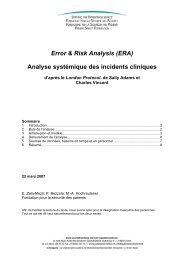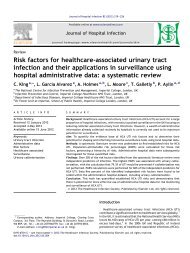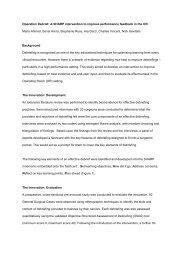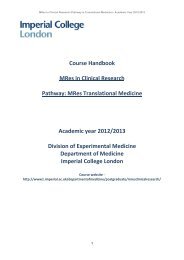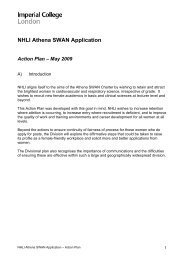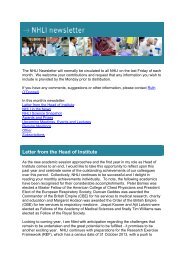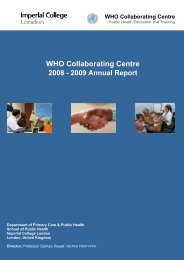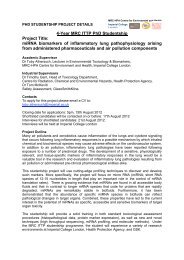QOF Plus Year 1 - Imperial College London
QOF Plus Year 1 - Imperial College London
QOF Plus Year 1 - Imperial College London
You also want an ePaper? Increase the reach of your titles
YUMPU automatically turns print PDFs into web optimized ePapers that Google loves.
Priority and relevance to national policyImproving self care for people, including those who live with a long-term condition, is a majorpolicy goal in health in the UK. It is estimated that more than 15 million people in the UK live witha long term condition (DoH, 2006), and long term conditions account for a high proportion of NHStime and resources. Approximately 80% of GP consultations are thought to relate to chronicdisease and patients with chronic disease or complications account for 60% of hospital bed days(DoH, 2004). Health professionals have a vital role in ensuring that patients understand theircondition, and supporting them to self-manage it.Self care includes both self care and self management and was highlighted in the NHS Plan (DoH,2000) as one of the key building blocks for a person-centred health service. The white paper ‘OurHealth, Our Care, Our Say’ (DoHh 2006) also emphasises supporting self care. Supporting Peoplewith Long Term Conditions to Self Care (DoH, 2006) highlights the importance of changing theunderlying culture of health and social care to promote individuals’ empowerment and self care.The Department of Health has recently issued the Common Core Principles to Support Self Carefor the health and social care workforce. Other national policies highlighting the role of self carein the management of long term conditions include the Expert Patients Programme (EPP), theNHS in England: the operating framework 2008/09 (DoH, 2007), and the introduction ofinformation prescriptions following a commitment from Our Health, Our Care, Our Say. Theprinciples of self-care and self-management are strongly emphasised in the recently publishedHigh Quality Care for All, the final report of the NHS Next Stage Review by Lord Darzi (2008). Thisreview is clear in its message that improved patient information is central to enabling patients tomake more choices in accessing healthcare and this is also seen as a means of addressing currentvariation in the quality of services. Achievement of these indicators would provide practiceassurance of the following Healthcare Commission core standards: C7e and C16.Local contextLocal patient consultation exercises have consistently shown that patients want improvedinformation about their GP practice and healthcare services available in the local area.According to Hammersmith and Fulham’s PCT’s Public Health Report 2006 (Carpenter andMayers, 2006), approximately 15% of residents state they have a limiting long-term illness. Theburden of long-term conditions in Hammersmith and Fulham is likely to increase as a result of theageing local population. It is therefore crucial to develop projects and strategies addressing selfmanagementof their conditions, which includes provision of high quality patient information,ensuring that patients are aware of the range of services and support available locally.All GP practices are required under the GMS contract to make information available to theirregistered population through a practice leaflet. In August 2008 the Primary Care Trust’sPerformance Monitoring Group reviewed the current leaflets provided by each of the 30 localsurgeries in Hammersmith and Fulham. The group found wide variation in quality both in terms ofthe content and format of leaflets. Leaflets vary greatly in quality of production and the amountof information that they contain. Some are simply a black and white photocopy, or printed-offsheet. Some are folded pull-outs; some are A5 brochures in colour, with additional informationabout self treatment for common conditions, and advice on the content of a family medical chest.71



